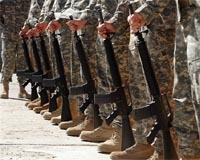| . |  |
. |
Chicago (AFP) July 16, 2009 US Defense Secretary Robert Gates on Thursday said he would fight lawmakers to ensure cuts to the F-22 fighter program, saying it was a test of efforts to reform entrenched military spending. "It is time to draw the line on doing defense business as usual," Gates said in a speech, adding that President Barack Obama would make good on a threat to veto any defense budget that includes money for new F-22 Raptors. "The president has drawn that line. And that red line with regard to a veto is real." Speaking to the Economic Club of Chicago, Gates portrayed the issue as a crucial test of whether military spending could be reformed and the defense establishment weaned away from habits formed during the Cold War. "If we can't get this right, what on earth can we get right?" The Obama administration has proposed capping production of the F-22 at 187 jets, meaning only four more would be built, but the Senate Armed Services Committee has drafted legislation funding seven more F-22s at a cost of 1.75 billion dollars. The F-22 Raptors, equipped with radar-evading technology and built by Lockheed Martin and Boeing, cost about 350 million dollars each and have been in development since the Cold War. The US Air Force had proposed building nearly 400 F-22s, which were designed to fight other sophisticated enemy fighter jets, but Gates vetoed further expansion as wasteful and unnecessary, especially given the slow development of rival fighter jets by potential adversaries such as China. Gates argued that the US jet of the future was the F-35 Joint Strike Fighter, which he said was more versatile and better at knocking out enemy air defenses. The administration's proposed 663.8-billion-dollar defense budget for fiscal 2010 scales back some major weapons programs while bolstering funding for unmanned aircraft, helicopters and other resources for counter-insurgency campaigns like the ones in Iraq and Afghanistan. The budget represented a modest increase over defense spending under former president George W. Bush, despite critics' claims that the administration has slashed military spending, Gates said. The military budget "adds up to about what the entire rest of the world combined -- friend and foe alike -- spends on defense," he said. "Only in the parallel universe that is Washington DC would that be considered 'gutting' defense." Gates acknowledged that previous administrations have struggled to rein in Pentagon spending and encountered stiff opposition from lawmakers and their sponsors in the defense industry. But he said "the stakes today are very high" with the country at war in an increasingly volatile world. The defense secretary, a Republican holdover from the Bush administration, said he had always been known as a hawk on national security during his long career at the Central Intelligence Agency. "Well, I haven't changed. I did not molt from a hawk into a dove on January 20, 2009" when Obama took office, he said. "But, the nature of the threats to us has changed. And so too should the way our military is organized and equipped to meet them," he said. Gates blasted what he called "requirements creep" in defense spending, where weapons programs were overloaded with unnecessary features "to the point of absurdity." The defense secretary gave as an example a proposed new presidential helicopter, which the administration has scrapped. "Once the analysis and requirements were done, we ended up with choppers that cost nearly half a billion dollars each and enabled the president to, among other things, cook dinner while in flight under nuclear attack," he said. Share This Article With Planet Earth
Related Links The Military Industrial Complex at SpaceWar.com Learn about the Superpowers of the 21st Century at SpaceWar.com
 US considers expanding army: Pentagon
US considers expanding army: PentagonWashington (AFP) July 15, 2009 Defense Secretary Robert Gates is weighing a possible temporary expansion of the US army to ease the strain from wars in Afghanistan and Iraq, his press secretary said on Wednesday. Gates was discussing the idea, backed by Senator Joseph Lieberman, with senior officers to add 30,000 troops to the active-duty army, press secretary Geoff Morrell told reporters. The possible expansion from ... read more |
|
| The content herein, unless otherwise known to be public domain, are Copyright 1995-2009 - SpaceDaily. AFP and UPI Wire Stories are copyright Agence France-Presse and United Press International. ESA Portal Reports are copyright European Space Agency. All NASA sourced material is public domain. Additional copyrights may apply in whole or part to other bona fide parties. Advertising does not imply endorsement,agreement or approval of any opinions, statements or information provided by SpaceDaily on any Web page published or hosted by SpaceDaily. Privacy Statement |